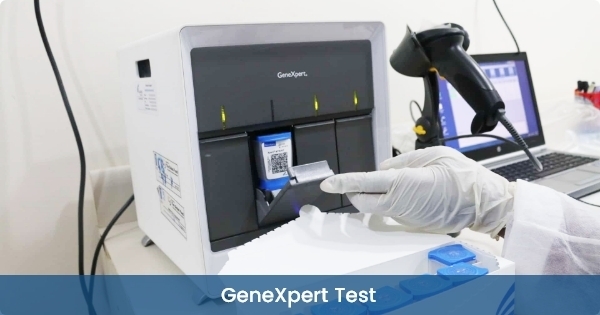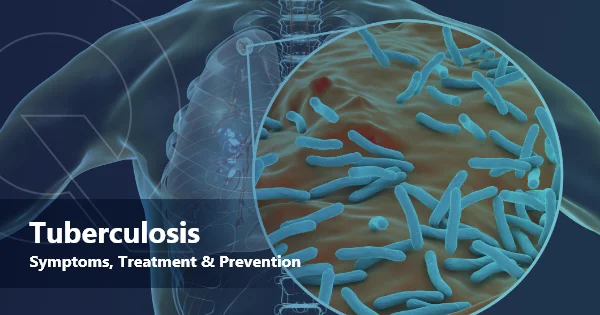INTRODUCTION:
- GeneXpert MTB/RIF (Xpert), introduced in the Philippines in 2011, is a rapid diagnostic test with high sensitivity and specificity for TB.
- It is also called Gene Xpert because it works as its name.
- The GeneXpert system utilizes a unique technology called real-time polymerase chain reaction (PCR) to detect and analyze genetic material, such as DNA or RNA, in a biological sample.
- The platform is designed to provide rapid and accurate results for a variety of infectious diseases, including tuberculosis, HIV, hepatitis, and respiratory infections.
- Is a highly sensitive and specific test for tuberculosis (TB) diagnosis that detects DNA sequences specific for Mycobacterium tuberculosis and rifampicin resistance i.e., rpoB gene.
- In circumstances where a direct smear test is negative, this test can quickly diagnose both the presence of tuberculosis and the presence of rifampicin resistance.
- A CBNAAT (catridge-based nucleic acid amplification test) called Gene-Xpert is a commonly used diagnostic tool for tuberculosis.
- It is still uncommon in developing nations like India since it is not readily available and is not cost-effective.
- The World Health Organization (WHO) concludes that the Xpert MTB/RIF and Ultra cartridge performance on the GeneXpert 10-colour instrument was found to be comparable to that of the GeneXpert 6-colour instrument for detection of TB and rifampicin resistance.
- The current WHO recommendations for Xpert MTB/RIF and Ultra cartridge use on GeneXpert 6-colour instruments are also valid for their use on GeneXpert 10-colour instruments.
How is GeneXpert Test done?
- Sample collection: The first step is to collect a biological sample from the patient, such as blood, sputum, urine, or cerebrospinal fluid, depending on the specific test being conducted.
- Sample processing: The collected sample is then processed to extract the genetic material (DNA or RNA) of the microorganism of interest. This step involves breaking open the cells, separating the genetic material, and purifying it for further analysis.
- Test cartridge preparation: The processed sample is mixed with the necessary reagents and loaded into a disposable test cartridge, which contains all the components required for the molecular analysis. The cartridge is designed to be used with a specific GeneXpert system model.
- Cartridge loading: The prepared test cartridge is inserted into the GeneXpert system. The system has multiple cartridge slots to accommodate multiple tests simultaneously, allowing for high throughput testing.
- Automated analysis: Once the cartridge is loaded, the GeneXpert system takes over and automates the entire testing process. It performs the necessary steps for the analysis, including reverse transcription, amplification, and detection of the target genetic material using real-time polymerase chain reaction (PCR) technology.
- Results interpretation: The GeneXpert system continuously monitors the PCR reaction and provides real-time analysis of the results. It can determine whether the target genetic material is present or absent in the sample, and it quantifies the amount of genetic material present. The results are typically displayed on the system’s interface or can be exported to a computer for further analysis.
- Reporting: Once the analysis is complete, the GeneXpert system generates a test report indicating the test result. The report may include information about the detected microorganism, its genetic characteristics, and sometimes additional information such as drug resistance profiles.
How much time does GeneXpert take?
- GeneXpert is a new test for rapid diagnosis of TB and drug resistance. The test is very fast and fully automated, detecting acid fast bacilli and drug resistance to rifampicin in less than 2 hours, as compared to standard cultures which detect growth in 3 to 5 weeks and an additional 3 weeks for drug resistance.
Which is better TB PCR test or GeneXpert?
Here are some points to consider regarding the advantages of GeneXpert (a type of TB PCR test) over conventional TB PCR tests:
- Speed and efficiency: GeneXpert provide rapid and automated results within a few hours, typically within two hours. This is significantly faster than conventional TB PCR tests, which may take several hours or even days to obtain results.
- Simplicity and ease of use: GeneXpert is designed to be user-friendly, with a fully integrated and automated system. It requires minimal technical expertise and reduces the chances of human error in the testing process. In contrast, conventional TB PCR tests often involve multiple manual steps and require more technical proficiency.
- Detection of drug resistance: GeneXpert is capable of simultaneously detecting TB and determining drug resistance, particularly for rifampicin, which is an indicator of multidrug-resistant tuberculosis (MDR-TB). This is crucial for appropriate treatment decisions and helps in guiding patient management. Conventional TB PCR tests may require additional steps or specialized assays to determine drug resistance.
- Point-of-care testing: GeneXpert is portable and can be deployed in decentralized settings, such as clinics or rural areas, as a point-of-care testing tool. It eliminates the need for sample transportation to centralized laboratories, reducing turnaround time, and improving patient access to timely diagnosis. Conventional TB PCR tests are typically performed in centralized laboratories.
What happens if GeneXpert is negative?
- Negative TB GeneXpert result and NOT on TB treatment.
- No action should be taken.
- Negative TB GeneXpert result and on TB treatment for active disease.
- One of several selected TB Clinic physicians will perform a case review to determine if treatment can be stopped.
- No diagnostic test can replace clinical judgment.
What is the limit of detection for GeneXpert TB?
- The limit of detection (LOD) for GeneXpert MTB/RIF, which is the most used GeneXpert cartridge for tuberculosis (TB) testing, varies depending on the specific target being detected.
- For the detection of Mycobacterium tuberculosis (MTB), the bacterium responsible for causing TB, the LOD of GeneXpert MTB/RIF is reported to be as low as 131-250 colony-forming units per milliliter (CFU/ml) in sputum samples.
- This means that the test can reliably detect MTB when the bacterial load in the sample is above this threshold.
- Regarding the detection of rifampicin resistance, which is an indicator of multidrug-resistant tuberculosis (MDR-TB), the LOD of GeneXpert MTB/RIF is approximately 5-10 CFU/ml.
- This means that the test can detect rifampicin resistance even when a very small number of resistant bacteria are present in the sample.
- It’s important to note that the LOD can vary depending on factors such as the sample type, the quality of the sample, and the presence of inhibitors or other interfering substances.
- Additionally, the LOD may be influenced by the specific version or model of the GeneXpert system being used, as Cepheid periodically releases updates and improvements to their platforms.
What sample is used for GeneXpert?
- To perform a test on the GeneXpert system, a patient’s biological sample is collected, such as sputum, blood, or tissue.
- The specific sample type required depends on the target disease or condition being tested. For example, for tuberculosis testing, sputum samples are commonly used.
- For respiratory infections, samples may include respiratory secretions collected through methods like nasal swabs or nasopharyngeal swabs.
- Once the sample is obtained, it is mixed with a reagent that contains the necessary components for the PCR reaction, such as primers and probes specific to the target genetic material.
- The mixture is then loaded into a disposable cartridge or test module that is inserted into the GeneXpert instrument.
- The GeneXpert instrument automates the entire testing process, including sample preparation, nucleic acid extraction, amplification, and detection.
- The PCR reaction takes place within the cartridge, and the instrument monitors the amplification process in real-time, allowing for the quantification and detection of the target genetic material.
- The results are typically available within a few hours, depending on the specific test being performed.
- Overall, the choice of sample for GeneXpert testing depends on the target disease or condition and the specific instructions provided by the manufacturer for each test.
- It is important to follow the recommended sample collection and handling procedures to ensure accurate and reliable results.
How accurate is GeneXpert? What is the Sensitivity and Specificity of GeneXpert Test?
Diagnostic efficacy of GeneXpert was assessed in 85 MTB culture positive cases with the overall sensitivity, specificity, PPV and NPV at 95% confidence interval of 98.6% (92.3–99.8), 100% (78–100), 100% (94.7–100) and 93.8% (69.7–98.9) respectively.
References:
https://erj.ersjournals.com/content/48/suppl_60/PA2775
https://erj.ersjournals.com/content/48/suppl_60/PA2775
https://www.cdc.gov/tb/publications/factsheets/testing/xpert_mtb-rif





